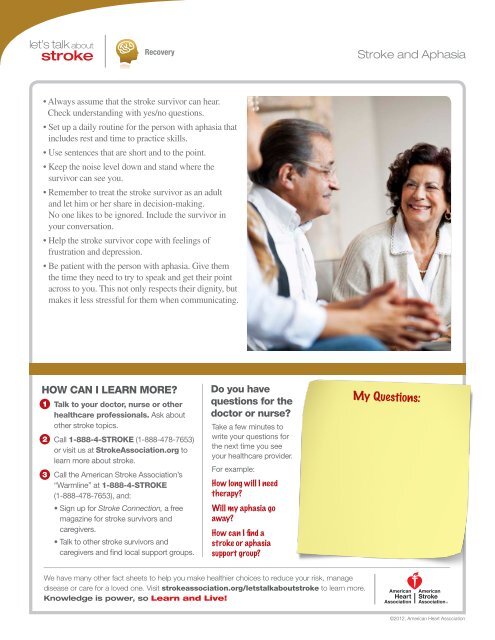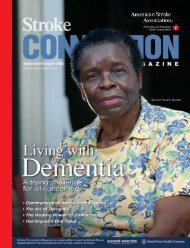Let's Talk About Stroke and Aphasia - American Stroke Association
Let's Talk About Stroke and Aphasia - American Stroke Association
Let's Talk About Stroke and Aphasia - American Stroke Association
You also want an ePaper? Increase the reach of your titles
YUMPU automatically turns print PDFs into web optimized ePapers that Google loves.
Recovery<br />
• Always assume that the stroke survivor can hear.<br />
Check underst<strong>and</strong>ing with yes/no questions.<br />
• Set up a daily routine for the person with aphasia that<br />
includes rest <strong>and</strong> time to practice skills.<br />
• Use sentences that are short <strong>and</strong> to the point.<br />
• Keep the noise level down <strong>and</strong> st<strong>and</strong> where the<br />
survivor can see you.<br />
• Remember to treat the stroke survivor as an adult<br />
<strong>and</strong> let him or her share in decision-making.<br />
No one likes to be ignored. Include the survivor in<br />
your conversation.<br />
• Help the stroke survivor cope with feelings of<br />
frustration <strong>and</strong> depression.<br />
• Be patient with the person with aphasia. Give them<br />
the time they need to try to speak <strong>and</strong> get their point<br />
across to you. This not only respects their dignity, but<br />
makes it less stressful for them when communicating.<br />
HOW CAN I LEARN MORE?<br />
<strong>Talk</strong> to your doctor, nurse or other<br />
healthcare professionals. Ask about<br />
other stroke topics.<br />
Call 1-888-4-STROKE (1-888-478-7653)<br />
or visit us at <strong>Stroke</strong><strong>Association</strong>.org to<br />
learn more about stroke.<br />
Call the <strong>American</strong> <strong>Stroke</strong> <strong>Association</strong>’s<br />
“Warmline” at 1-888-4-STROKE<br />
(1-888-478-7653), <strong>and</strong>:<br />
• Sign up for <strong>Stroke</strong> Connection, a free<br />
magazine for stroke survivors <strong>and</strong><br />
caregivers.<br />
• <strong>Talk</strong> to other stroke survivors <strong>and</strong><br />
caregivers <strong>and</strong> find local support groups.<br />
Do you have<br />
questions for the<br />
doctor or nurse?<br />
Take a few minutes to<br />
write your questions for<br />
the next time you see<br />
your healthcare provider.<br />
For example:<br />
How long will I need<br />
therapy?<br />
Will my aphasia go<br />
away?<br />
How can I find a<br />
stroke or aphasia<br />
support group?<br />
We have many other fact sheets to help you make healthier choices to reduce your risk, manage<br />
disease or care for a loved one. Visit strokeassociation.org/letstalkaboutstroke to learn more.<br />
Knowledge is power, so Learn <strong>and</strong> Live!<br />
<strong>Stroke</strong> <strong>and</strong> <strong>Aphasia</strong><br />
My Questions:<br />
©2012, <strong>American</strong> Heart <strong>Association</strong>







